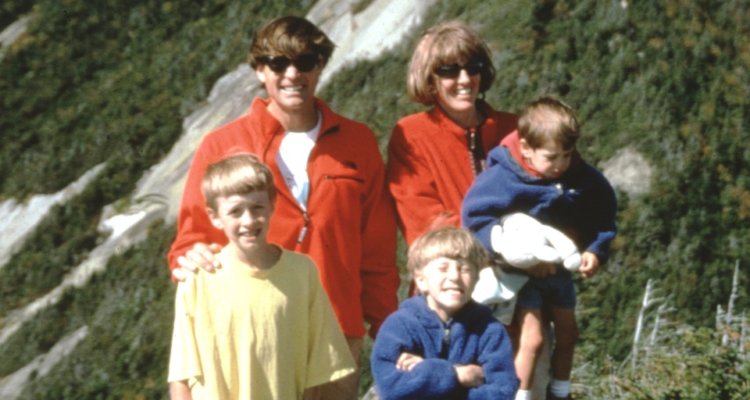After the secondhand altitude sickness, the most intense vicarious response inspired by the rock-climbing documentary “Free Solo” is pity — in part for its subject Alex Honnold, a daredevil single-mindedly driven to defy death, but more so for his girlfriend. Amidst all the terrifying, enthralling footage of Honnold scaling sheer cliffs, the standout scene finds him and now-wife Sanni McCandless having a frank discussion about the strain his passion has put on their relationship. She asks him if the love they share would ever have an impact on his decision-making, and he shuts it down by responding, “I could just not do certain things, but then you have weird simmering resentment because the things you love most in life have now been squashed. Do you know what I mean?” It’s a painful exchange, and the film gives it the moment it’s due before moving on to Honnold’s latest feat of recklessness. “Torn,” a new doc also released by National Geographic in the spirit of a clear follow-up to its Oscar-winning success, devotes itself in total to that briefly expressed emotional friction.
READ MORE: Telluride 2021 Preview: 10 Must-See Films To Watch
The worst-case scenario McCandless feared came to pass for the Lowe family, who lost their paterfamilias Alex to an avalanche on Mount Shishapangma in the Tibetan Himalayas during a 1999 expedition. His son, Max Lowe, has trawled through his mother’s extensive backlog of home movies for his feature debut, which begins as an archival tribute to an extraordinary man before sorting through the tangle of difficult feelings his death left behind. He, his brothers, their mother, and their stepfather (Lowe’s climbing partner Conrad Anker) must all reconcile their affection for someone they held close with the hurtful awareness that he evidently preferred being at 26,000 feet to home with his kids. Grief is an uphill battle, a metaphor that turns literal once his long-lost body is recovered and the Lowes decide to summit the mountain that bested him to spread his ashes.
READ MORE: Fall 2021 Movie Preview: 60+ Must-See Films
A clip from one of Alex Lowe’s late-night TV appearances conveys the level of celebrity he attained as the world’s most intrepid explorer and summarizes his priorities as a man. The host asks him if he feels any guilt for ambling up far-off peaks while wife, Jennifer, raises the children, and he all but brushes it off. One might expect those who survived him to have some of that “simmering resentment” Honnold mentioned, Lowe having selfishly conflated what was important with what was important to him. But director Max keeps the tone predominantly warm and upbeat, the two elder sons understanding that their father could breathe easiest in thin air. Though he stops short of voicing any overt criticisms, youngest son, Isaac, puts up a somewhat chillier front, having virtually no memory of his dad’s presence in the home. The eulogizing of Alex has the polite sentimentality of a newspaper obituary, emphasizing his charisma, strength, and the very zest for life that ultimately got him killed.
READ MORE: Telluride 2021 Lineup Includes ‘King Richard,’ ‘C’mon C’mon,’ ‘Louis Wain’ & More
As the years fly by in reams of videotape, the family begins the process of healing and accepting that their scar will never fade. The most touching segments focus on Anker’s assimilation into the ranks of the Lowes, first as a supportive caregiver in an effort to assuage his overwhelming survivor’s guilt, then as Jennifer’s lover. The sons display an unexpected maturity in their acceptance, recognizing that Anker is the only other person alive who cared for their late father as much as they do. Jennifer talks about their unconventional courtship in poetic terms of inevitability, without minimizing the self-consciousness and murmurs spurred by their union. They all process Alex’s passing in their own ways and at their own pace, the film’s prevailing message being no matter how a person goes through this, it is natural and right.
The trek up Shishapangma brings an orderly sort of closure to their journey, catharsis waiting for them at the top. Editing mostly condenses their way up, to the point that their swift passage verges on anticlimax in comparison to the daunting shots captured by Alex’s crew. The visceral impact may be lessened, but in terms of characterization, the final farewell is pregnant with layered meaning. By laying their father to rest, the bereaved don’t just make their peace with his departure, but also free themselves from any lingering anger over his absenteeism in life and his vanity in death. Alex’s career in flirting with peril amplified the difficult need for forgiveness that everyone must contend with after losing a parent. While Max demonstrates a consciousness of this transformative inner crisis, his misty-eyed filmmaking lacks the rawness experienced by those trudging through a personal hell onscreen. The prominent placement of a heartrending card the boys send to Dad on one of his trips offers an apt symbol for the film as a whole; its fond making can’t obscure the wound by which it’s been motivated. [B-]
Follow along with our full coverage from the 2021 Telluride Film Festival here.

